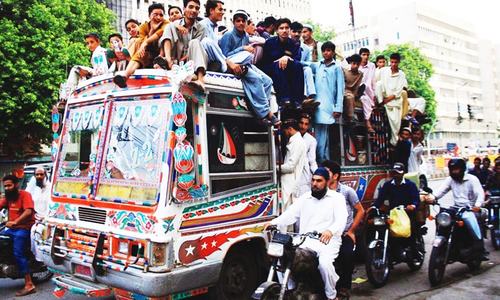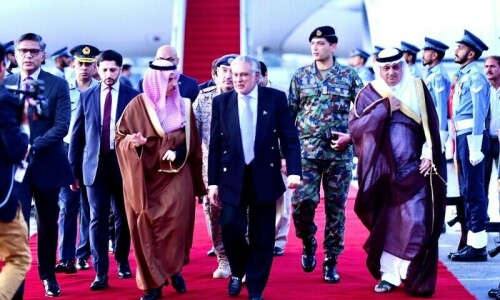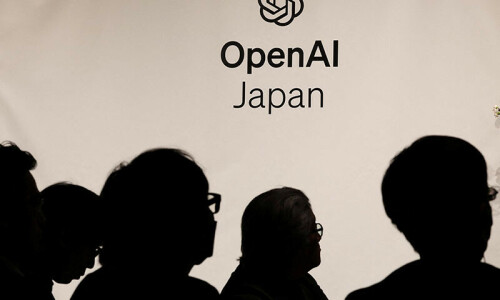PAKISTAN has been struggling to meet its fast-growing demand for transport and provide quality transportation to a rapidly urbanising population.
Standing at around 208 million, the nation is already the sixth most populous in the world with a 2.4 per cent growth rate. The Planning Commission has estimated that Pakistan’s population travels nearly 400 billion passenger-kilometres (pkm) each year, which is expected to rise to 1,000bn pkm by 2030 and add pressure on the transport infrastructure.
The urban population accounts for approximately 76m or 36pc of the population and is set to reach around 60pc by 2025. Keeping this in mind, investments in road transport infrastructure and mass transit systems have so far been the focus.
Yet, such improvements have fallen short of the challenge at hand, resulting in growing congestion and both environmental and safety problems. Karachi, Peshawar and Lahore have been ranked low in terms of liveability due to the environmental quality.
Transport itself contributes 22.3pc to the services sector GDP and accounts for approximately 6pc of the nation’s total employment, says the Planning Commission that has recently got approved a National Transport Policy from the Pakistan Muslim League-Nawaz government as a starting point to be followed with sectoral master plans.
An underlying theme of the policy seeks fares of all transport modes to reflect true costs, including environmental and social externalities
The development in the transport sector has been unbalanced with no coherent institutional framework or up-to-date legislation. This has resulted in poor integration of transport services, underutilising the full potential of road, rail, air, ports, pipelines and waterways in Pakistan.
On the other hand, the local logistics industry is under-developed and does not provide cost-effective and integrated modern logistics services.
Pakistan ranked 68th on the World Bank’s Logistics Performance Index of 160 nations in 2016 for the quality of trade and transport infrastructure, although it has improved from its 110th position in 2010.
Although the new National Transport Policy did not concede to a demand from stakeholders for the creation of a transport ministry for coordinated development of the entire transport chain, it nevertheless wants to upgrade and modernise all the transport modes in an integrated manner through a cabinet committee on transport to be chaired by the Prime Minister.
An underlying theme of the policy seeks fares of all transport modes to reflect true costs, including environmental and social externalities.
Urban transport will be a single integrated system for public/private transport, non-motorised transport, and freight transport. Individual urban transport master plans will be developed for all major cities on a 10-year time frame and with a 20-year horizon.
Public transport will cover the metropolitan urban area, integrating the main destinations with inter-urban transport terminals. Mass transit systems, including bus rapid transit and commuter rail lines will be considered for all cities.
Freight will be routed through dedicated freight corridors, limiting urban pass-through transport. For large urban cities, final mile distribution centres will be established.
The priority for passenger transport by road will be to enhance the usage of non-motorised transport and public transport. Private transport will be considered complementary to non-motorised transport.
For freight, the predominant movement by road transport will increasingly be shifted to rail and pipeline by better integration of agriculture and industry to rail stations, dry ports, and pipelines.
Rural roads will remain vital for providing accessibility to local communities and public services, while urban roads will be designed to support efficient and effective urban transport. The international road transport will be supported by accession to and implementation of relevant international road transport agreements and conventions.
Railway operations would be organised to become more commercially viable and will remain in the public sector. Private sector participation in railway operations and maintenance will be encouraged and promoted, in ways that serve the public interest.
For passengers, rail transport will prioritise the provision of fast and reliable inter-urban services between all major urban centres. For freight, rail transport will focus on the provision of long-haul transport, particularly of container, trailer and bulk commodities, to reduce the share of freight moving on the road network.
Direct connectivity to, and inter-modal connections between the ports, dry ports and industrial areas will be enhanced. Dedicated inter-modal terminals for passengers will be provided within and near urban areas to connecting public transport.
Air transport will be liberalised in accordance with the open skies policy on a reciprocal basis to stimulate new entrants establishing new routes and increasing the number of flights to and from Pakistan. Specific domestic routes for socio-economic purposes will be targeted via Public Service Obligations.
Pakistan Civil Aviation Authority will be restructured, separating its regulatory and service provision responsibilities. The CAA may enter into suitable public-private partnerships for operation, management and development of airports.
The maritime sector shall be geared to become a major engine of growth through its support and facilitation of international trade. Karachi port and Port Qasim will serve as the primary international gateway ports for all types of commodity shipments, with Gwadar Port balancing national trade opportunities, transhipment and regional transit.
Oil, gas and bulk liquid will principally be transported via pipelines. Bulk dry commodities will be considered via slurry pipelines or conveyors upon establishment of a supporting business case. Pipeline connections will be established to ports, terminals, refineries, storage depots, dry ports, airports, industrial zones and to the periphery of urban areas.
Published in Dawn, The Business and Finance Weekly, June 19th, 2018











































